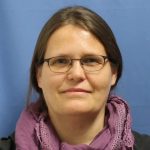January 2023 Edition

Uta Ruett, Physicist, Group Leader, XSD
Are successful women in science and math truly exceptional, or do social biases simply frame them that way?
Uta Ruett, a physicist and group leader in the X-ray Sciences Division (XSD), faced this question as a young student in Germany. While she easily achieved high scores in physics and math and was often labeled “exceptional” for her work, female peers were routinely rated lower than boys showing very similar performance.
“How is this fair?” Ruett remembers wondering. “I was always told, ‘Uta, you are an exception!’ But I never wanted to be treated as an exception. I truly think it was bias.”
Ruett received considerable support from instructors and mentors in both Germany and the United States. Eventually, she earned a PhD in Physics from the University of Hamburg. However, even after earning that difficult degree and excelling in her work, she ran into overt discouragement based on her sex.
“When I was told by someone I admired that I shouldn’t waste my time getting a PhD because eventually I would just get married, have children and then drop out, it was very hurtful,” said Ruett. “It also took me off guard because he was kind in every other way. I think he just said what many people think. And it was indeed a question for me, if I could work in science and still be a mother in the future.”
In fact, Ruett did get married, have three children in short sequence, and paused her career. She was offered a part-time position as scientist after staying at home with her first son for more than a year. The professor who encouraged her return to work was very supportive of women in science and continued to offer highly flexible work conditions after her second son was born.
The position ramped quickly into more time-consuming ones. Ruett alternated between onsite and remote work, putting in unusual hours at night and on weekends. “I tried to make it look easy, but it wasn’t easy,” said Ruett with a laugh.
Today, she advocates for other women and caregivers at Argonne to have better experiences. As president of Argonne’s Employee Resource Group for parents and caregivers (PACE), she believes that the more flexible work options encouraged during the pandemic are a huge step forward for women and society in general.
“Remote work, if possible, is a real breakthrough,” she said. “You do have to adjust the workflow, but it can be a huge win-win.”
Ruett believes it’s also important that men who step up as caregivers themselves talk about it. “When a male director at Argonne says that he has to reschedule an appointment because he needs to drive his daughter to the dentist, it demonstrates acceptance and respect for work-life balance on all career levels.”


